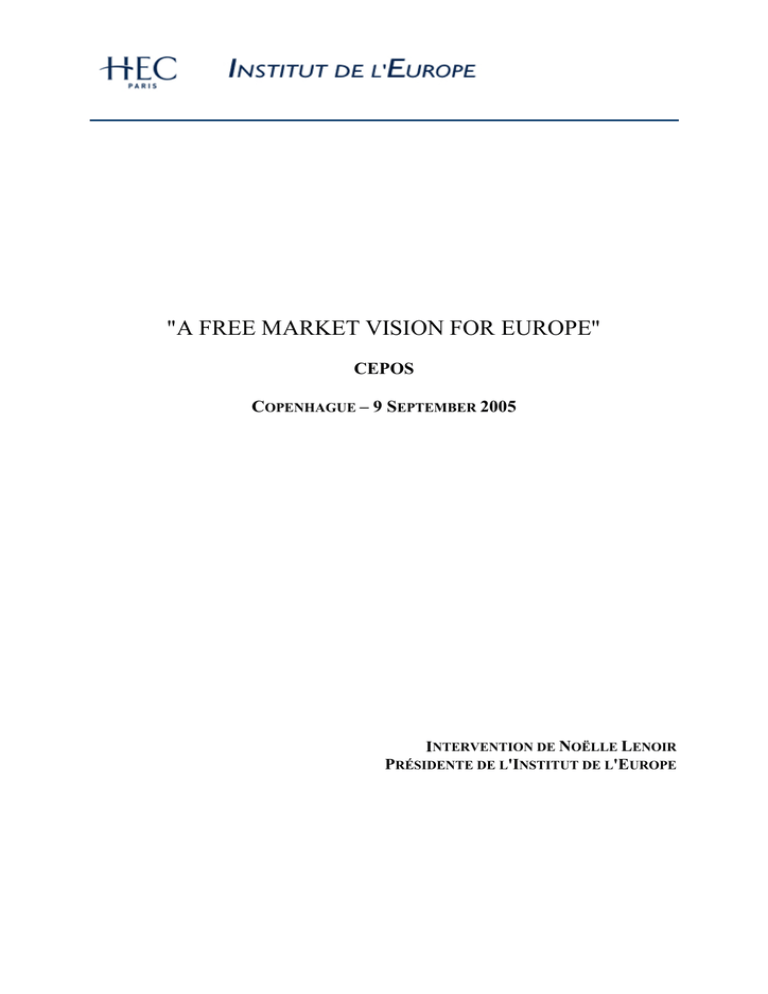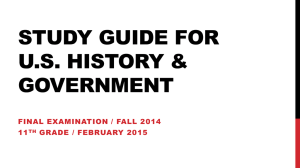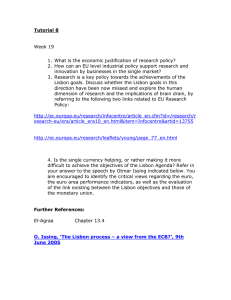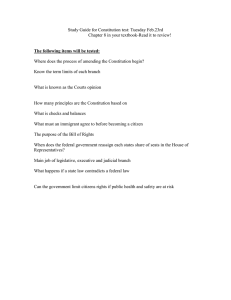A FREE MARKET VISION FOR EUROPE
advertisement

"A FREE MARKET VISION FOR EUROPE" CEPOS COPENHAGUE – 9 SEPTEMBER 2005 INTERVENTION DE NOËLLE LENOIR PRÉSIDENTE DE L'INSTITUT DE L'EUROPE A FREE MARKET VISION FOR EUROPE The present situation in the European Union is in many ways paradoxical. First paradox: the Double No vote on the EU Constitution is without a doubt the most important trauma ever suffered by Europeans since the creation of the European Community in 1957; yet, according to recent polls the French as well as the Dutch continue to strongly affirm their pro Europe stance. More generally European citizens are certainly much more pro Europe than their governments usually think. They just feel insufficiently informed about what it exactly means to be European. Secondly: as everyone knows, there’s little new in the EU Constitution regarding the functioning of the market. Europe’s economic competences are almost unchanged by the constitutional treaty; yet, at least in France, the main criticisms expressed by those pushing for a No vote were pointed at Europe’s market economy as if they had only just discovered that free trade and fair competition had from the very beginning been at the very root of the European construction and of European prosperity. Third paradox: the euro is undoubtedly the best achievement of the EU both politically and economically speaking. I admit that you could live perfectly well without it as is the case in Denmark. But I’m convinced that the single currency is the best expression of European will to build an integrated economy based on a common instrument easily used by all citizens across the Euro zone; yet, as was once again stressed by the ECB just three days ago, the Euro zone long term growth outlook is gloomier than those of European countries which have not yet adopted the single currency because of difficulties faced by its biggest economies. How then to convince these countries’ citizens that Europe’s economic integration is beneficial? How to prevent them from thinking that there is a relationship between Europe’s more and more integrated market and unemployment? How to avoid responding to populist discontent by an escalation of protectionism? Optimism and pessimism is not equally shared by all Europeans. Globalisation, the biggest challenge, is not regarded in the same way everywhere in Europe. In Denmark it’s a plus in so far as the Danish seem to recognize the new worldwide division of labour is able to boost competitiveness in encouraging innovation and opening new markets. Conversely, in France, I must say that in our still somewhat dirigist system, many fear the strong winds of competition. I want to reassure you however; many French companies are extremely successful and invest all over the world. But French society as a whole hasn’t yet realised that outsourcing doesn’t automatically mean the loss of their jobs. Whatever the reasons for the malaise in parts of Europe, we’ve got to go ahead and continue to build on the successes of our very dynamic common powerhouse. I’m not minimizing the depth of the crisis we’re in right now, but that’s not to say that there isn’t light at the end of the tunnel. Judging from EU history, European governments have always been able to find economic solutions to political crisis. Just two well-known examples: First, after the collapse of the European Defence Community in 1954, (due by the way “encore” to the rejection by the French Parliament of the treaty it had proposed two years earlier…), the French and German leaders promoted the “Common Market” as an alternative proposal. And it was and still is a resounding success! Similarly, unforeseen German unification and the necessity to respond to the new political dynamic gave rise to the creation of the single currency along with two other revolutionary measures: the growth and Stability Pact and the creation of the ECB as a totally independent body. And now enlargement, that’s to say reunification of Europe for so long waited. The answer is meant to be the Constitution. I’m not one of those who consider the Constitution to be dead. But to be realistic, I don’t think now would be the best of times to submit it again to the French. If the political future of Europe is difficult to define, since there are so many visions of the European project amongst Member States, one thing is sure: there can be no true political unification and integration without robust reforms. They can only go hand in hand. The main purpose is to take full advantage of the extraordinary European market already in place which doesn’t mean renouncing but rather reforming welfare. Specifically here are in my view three ways. First, I think that we have urgently to overcome the Lisbon strategy failure. Without a doubt, it was a good goal set. However in many countries it’s only been a mere declaration, which has by and large actually been detrimental to Europe’s credibility. It’d be hard to disagree with the Kok report when it stated that the Lisbon Strategy is en danger to become the “synonym of missed objectives and failed promises”. This doesn’t mean that countries have not carried out very positive reforms. In this light, the French government has begun to adapt our pension system and our health care system to the demographic and social challenges. This doesn’t mean that I’m not aware that structural reforms are not a piece of cake to put in place. As Prime Minister Junker put it so well “we all know what we need to do, but we don’t know how to win elections after we have done it”. With all this in mind, I personally think the time has come to put teeth in the Lisbon strategy. At present it is purely intergovernmental, and it doesn’t work. What about putting a little pressure on governments through the well tested Community method? To implement the Lisbon Strategy would be the more valuable it’ll help proving that free trade is fully compatible with welfare and social protection. The other thing that has got to go through is a much stronger push for research and development. In certain sectors Europe clearly excels, notably in telecommunications and aerospace to start. But the fact is that we do lag in other sectors for well-known reasons. We simply aren’t fulfilling our great potential. As Paul Valery put it “civilizations are mortal” which I have always taken to mean that a society can fade away if it doesn’t renew itself. The question raised by Prime Minister Blair about the allocation of the European budget is right and it is one we all wrestle with. Above all we have to boost Europe’s innovation policy, everybody admits this. With good reason, there’s a sense of urgency. All I can say is “just do it”: dramatically increase European spending for R and D. If the best we can do now is only to agree on a very modest budget for the years to come, let’s at least set a date, not too far away of course, to revisit and potentially up it. If we miss adopting the budget, voilà another political crisis! Along these lines, I also think that to adopt the Community patent regulation is key. I must say it’s a duty. We have to remind ourselves that as long ago as 1787 the American Constitution gave inventors the right to patent protection. The third urgency to benefit a free global market is to foster confidence amongst Member States. In an enlarged EU of 25 Member States, different administrative cultures and structures as well as a lack of agreed procedure are significant barriers to working together. If we want to achieve the internal market, which is still much too fragmented, we mustn’t only continue to harmonize rules and regulation, but make sure that in implementing them, we are all on the same page. It’s impressive that you in Denmark have recently set up a “Task Force for the Internal Market” (TIM) just to scrutinize if businesses and administrations feel part of the fabric of the European regulatory system. If only it could be this way for every country. In the same token, Solvit a new European network system whose aim is to help both citizens and businesses solving problems regarding their legal rights across Europe is an efficient way to avoid misapplication of internal markets rules. Likewise it’s likely that one day down the road there’ll be central regulatory bodies, such as the American FDA or SEC, to ensure in applying our common rules that we are speaking the same language. To wind up, all in all, the free market is a mechanism to ensure the effectiveness of our basic values, essentially freedom and democracy, and also justice, solidarity and nondiscrimination. But everyone knows that the real question is to make the European project palatable, legitimate and acceptable to citizens throughout Europe. “In dreams begin responsibility” as Yeats the famous Irish Poet said. Indeed the European construction will only continue if leaders are able to make the dream come alive for all the peoples of Europe. As at the time of the foundation of Europe after World War II, this responsibility is no less crucial and even more so. Noëlle Lenoir Copenhagen September 2005






